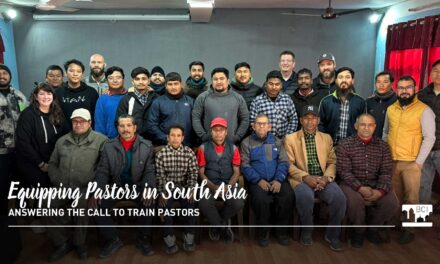LoveLoud ministries open doors for evangelism
Editor’s note: The North American Mission Board’s evangelism ministries are focused on six primary areas: Evangelism Networks/Resources, Chaplaincy, LoveLoud ministry evangelism, Disaster Relief, Church Revitalization and Collegiate evangelism. This article, the second in a series of six, spotlights LoveLoud ministry evangelism. The first article can be found here.
By Joe Conway

Connecting churches’ missions and outreach strategies to ongoing community engagement that leads to gospel proclamation is one of the primary goals of LoveLoud. Serving neglected communities, neighbors and children is a hallmark of the LoveLoud movement. NAMB photo by John Swain
ALPHARETTA, Ga. – Pure and undefiled religion before our God and Father is this: to look after orphans and widows in their distress and to keep oneself unstained by the world (James 1:26-27, HCSB).
James writes that one measure of true religion is evidenced by how Christ followers treat the neglected. LoveLoud is a movement of churches demonstrating God’s love by meeting significant human need while sharing Christ.
The search for the neglected is not a difficult one. Look no further than your local public school. That’s what they did in Jackson, Ga.
The congregation of Jackson’s Macedonia Baptist Church decided to do something to help the hundreds of students in their community who may not get regular meals during the summer. For 10 weeks last summer their church joined two other congregations in providing lunches for more than 200 local children whose families said they’d like to have the help.
“I hope [our community] sees the love of Christ coming through us,” said Lane Sanders, pastor of Macedonia Baptist Church. “We don’t look at ourselves as separated unto ourselves, but we have a mission and an investment in the community.”
According to Jerry Daniel, the North American Mission Board’s LoveLoud team leader, Macedonia Baptist is one of a growing movement of Southern Baptist churches that are demonstrating God’s love by meeting significant human need while sharing Christ.
“There’s a movement happening among Southern Baptists,” Daniel said. “God has created a groundswell of churches that are loving their communities like Jesus would. We want to highlight this and encourage other churches to get involved.”
Sanders says his church members delivered lunches in neighborhoods they had never visited and met people struggling with great need. Several of the children they’ve fed last summer attended the church’s Vacation Bible School. At least one of them committed her life to Christ.
Discovering a similar need among students in Philadelphia, Chuck Kieffer thought of a novel solution. Kieffer, a church planter and pastor of Philadelphia’s The Foundry Church, led his congregation to reach their urban neighbors by growing fresh produce. Their urban garden naturally provided teachable moments, along with a 500-pound annual yield of fresh produce. Garden Camp, an urban gardening-based Vacation Bible School, was the next step.
“We teach gardening techniques and nutrition, which are easy to bridge to biblical concepts of our Creator,” says Kieffer of the weeklong VBS. “Doesn’t every church have some piece of ground they are not using? Every church can do this.
“We live in an area in Philadelphia that is a true paradox. We are just a few blocks from some of the wealthiest residents of the city, but within our immediate area 1 out of 3 children go to bed hungry each night. We have to do something to help feed them and reach them for Christ,” says Kieffer.
As part of its efforts to help foster a LoveLoud movement through churches, NAMB is trying to shine a spotlight on activities like those championed by Macedonia and The Foundry in hopes that such examples can serve as a model for other churches.

Glen Young (right), pastor of Clear Lake Baptist Church, helps put a new roof on a home as part of Loving Houston during Crossover Houston prior to the 2013 annual meeting of the Southern Baptist Convention. Sustained, tangible community engagement is one of the key elements of LoveLoud. NAMB photo by John Swain
“We are collecting data and identifying churches and ministries involved in mercy ministries,” said Ryan West, NAMB’s national director for LoveLoud. “We are furthering the conversation of what churches are already doing. We are attempting to help foster and build networks.”
West says one goal is to help those involved in mercy ministries feel more connected to others doing similar work.
“There are some common issues among caregivers. Many struggle with the feeling of isolation. They think they are attempting to assist the neglected in their community by themselves. One thing we can do is help them find partners and others who are helping the neglected in their communities in other ways. This helps alleviate that sense of becoming overwhelmed by pressing needs,” said West.
An aspect of the LoveLoud movement that makes it attractive to cities is how those deeply involved in mercy ministry are instruments of peace in their cities–personal peace through the presence of Christ and peace within the community.
“Many cities have a dry environment without connection to a vibrant faith community. LoveLoud brings a refreshing peace. The gospel brings the fountain of life to the desert,” said West.
It is precisely this result that so often opens the doors to gospel conversations and faith encounters, says West. Mercy ministries with ties to local churches are important when people come to faith in Christ. Established relationships help new Christians feel welcome when they come to worship and join churches.
Explore how your church can expand its mercy ministry to neglected neighbors, communities and children near you through LoveLoud at http://www.namb.net/loveloud.
Joe Conway writes for the North American Mission Board. Tobin Perry contributed to this article.








